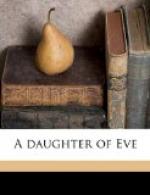In 1833, this edifice of happiness, so carefully erected by Felix de Vandenesse, began to crumble, weakened at its base without his knowledge. The heart of a woman of twenty-five is no longer that of a girl of eighteen, any more than the heart of a woman of forty is that of a woman of thirty. There are four ages in the life of woman; each age creates a new woman. Vandenesse knew, no doubt, the law of these transformations (created by our modern manners and morals), but he forgot them in his own case,—just as the best grammarian will forget a rule of grammar in writing a book, or the greatest general in the field under fire, surprised by some unlooked-for change of base, forgets his military tactics. The man who can perpetually bring his thought to bear upon his facts is a man of genius; but the man of the highest genius does not display genius at all times; if he did, he would be like to God.
After four years of this life, with never a shock to the soul, nor a word that produced the slightest discord in this sweet concert of sentiment, the countess, feeling herself developed like a beautiful plant in a fertile soil, caressed by the sun of a cloudless sky, awoke to a sense of a new self. This crisis of her life, the subject of this Scene, would be incomprehensible without certain explanations, which may extenuate in the eyes of women the wrong-doing of this young countess, a happy wife, a happy mother, who seems, at first sight, inexcusable.
Life results from the action of two opposing principles; when one of them is lacking the being suffers. Vandenesse, by satisfying every need, had suppressed desire, that king of creation, which fills an enormous place in the moral forces. Extreme heat, extreme sorrow, complete happiness, are all despotic principles that reign over spaces devoid of production; they insist on being solitary; they stifle all that is not themselves. Vandenesse was not a woman, and none but women know the art of varying happiness; hence their coquetry, refusals, fears, quarrels, and the all-wise clever foolery with which they put in doubt the things that seemed to be without a cloud the night before. Men may weary by their constancy, but women never. Vandenesse was too thoroughly kind by nature to worry deliberately the woman he loved; on the contrary, he kept her in the bluest and least cloudy heaven of love. The problem of eternal beatitude is one of those whose solution is known only to God. Here, below, the sublimest poets have simply harassed their readers when attempting to picture paradise. Dante’s reef was that of Vandenesse; all honor to such courage!
Felix’s wife began to find monotony in an Eden so well arranged; the perfect happiness which the first woman found in her terrestrial paradise gave her at length a sort of nausea of sweet things, and made the countess wish, like Rivarol reading Florian, for a wolf in the fold. Such, judging by the history of ages, appears to be the meaning of that emblematic serpent to which Eve listened, in all probability, out of ennui. This deduction may seem a little venturesome to Protestants, who take the book of Genesis more seriously than the Jews themselves.




